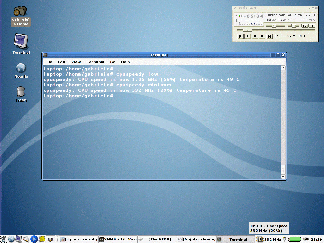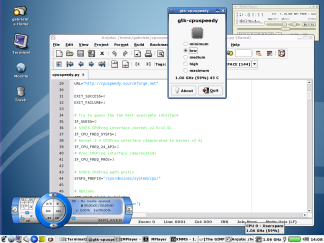|
c p u s p e e d y
A simple and easy to use program to control the speed and the voltage of CPUs on the fly.
|
| features::news:: screenshots::download ::bugs::contacts::sourceforge |
|
Cpuspeedy is a simple tool written in
Python
which allows you to change the clock speed and voltage of the
CPUs using the Linux's CPUFreq driver. A graphical frontend written in C using GTK+-2 libs is also available.
All you need is a supported CPU and a kernel which has the CPUFreq driver compiled in. Cpuspeedy is a user space program, so it will work on every processor supported by the kernel's CPUFreq driver. Use it and you should save battery consumption and reduce the temperature of your laptop. Cpuspeedy will work with the Linux kernel version 2.6.x/2.5x using the sysfs interface and with 2.4.x kernels using the CPUFreq proc interface. Features
News2004/07/02cpuspeedy version 0.4.1 released.
2004/05/23 pythermalzone.py is now checking for every dir in the /proc/acpi/thermal_zone/ directory. If the temperature file is found, then its value is read. This should fix a bug that prevented cpuspeedy to get the cpu's temperature in those systems where the path to the temperature file is not /proc/acpi/thermal_zone/THRM Thanks to Nathaniel McCallum. cpuspeedy version 0.4.0 released.
2004/04/20 It is now possible to specify to cpuspeedy a specific frequency value to be set. The numeric value must be expressed in KHz, MHz or Ghz. A function to convert speed from GHz,MHz to KHz was added. The code was checked with "pychecker" for common bugs An option (--freqs) to display available CPU frequencies was added. A check was added to verify the availability of the userspace governor in the pycpufreq sysfs interface. The "--dump" option is now working again (a couple of bug were fixed) pythermalzone.py module was added. gtk-cpuspeedy version 0.3.0 released.
2004/04/18 Menu icon and .desktop file added. The CPU speed and temperature status label text is now bigger and bold. Command line arguments are now enabled. An option to specify the path to cpuspeedy was added. Options were added to disable version checking and path checking. cpuspeedy version checking is now correctly handled. The about window text is now selectable. cpuspeedy version 0.3.0 released.
2004/04/06 cpuspeedy.py has been splitted in several .py modules that are installed in the $PREFIX/lib/cpuspeedy directory. A bug with the definition of the error exceptions classes is now fixed. A man page was added. A Makefile was added. It replaces the old install.sh install script. gtk-cpuspeedy version 0.2 released.
2004/03/29 Fixed a potential bug with fclose() to close the open pipes, pclose() is now used instead. cpuspeedy version checking added. Tooltips for the radiobuttons were added. cpuspeedy Version 0.2.1 released.
2004/03/28 A typo was fixed. Thanks to Daniel Black and William Maddler for pointing this out. A help message displayed on INTERFACE_INVALID or INTERFACE_NONE error was added. Error exit codes were added. gtk-cpuspeedy Version 0.1 released.
2004/03/22 gtk-cpuspeedy is a graphical GTK+-2 frontend for cpuspeedy. Version 0.2 released.
2004/03/17 An option to print the CPU speed and temperature was added. Some modifications to make cpuspeedy work with the soon to be released GTK+ frontend were made. Version 0.1.1 released, minor bugfixes.
2004/03/16 Version 0.1 released, initial release.
ScreenshotsPrerequisitesYou need a CPU that supports frequency scaling and the CPUFreq interface. Then of course you should be running Linux v2.6/2.5 that includes the sysfs interface or Linux 2.4 with the CPUFreq driver interface included as well.Download (Sources)Download (Packages)
Contactscpuspeedy has been written by Gabriele Giorgetti. Any feedback about this program is more than welcome !Copyright (C) 2004 Gabriele Giorgetti
|

